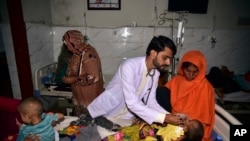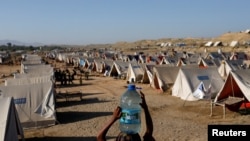A senior U.N. official warns flood-ravaged Pakistan is entering a second wave of death and destruction from outbreaks of diseases, including malaria, dengue, diarrhea, scabies and other skin diseases.
Julien Harneis, U.N. Resident Coordinator and Humanitarian Coordinator in Pakistan, said the first wave of this climate-induced disaster has caused wide-scale destruction of roads, bridges, homes, and other infrastructure.
“They show what happens, what are the consequences when we do not stop global warming. The scale of it is beyond imagination. It is a climate change disaster that you can see from space.”
The United Nations reports an estimated 1,700 people have lost their lives, a third of them children, and 12,800 have been injured. It says more than 33 million people are affected by the floods, which have displaced 7.9 million.
Harneis said the wave of diseases spreading across the affected areas will lead to many more deaths, especially among children, millions of whom are suffering from acute malnutrition.
The U.N. Children’s Agency (UNICEF) said at least 3.4 million children need immediate lifesaving support.
Harneis said people are getting ill and dying from lack of health, nutrition, water and sanitation services, and lack of access to latrines across the flooded affected areas.
“People who are defecating in the waters and then drinking from those same waters. Children who are washing in those waters. So, that is the driver of illness and disease and at the same time more than 1,700 health facilities and hospitals have either been destroyed or damaged.”
Consequently, he noted, the health systems that normally would protect people from such risks are not fully functioning.
He said another threat is food insecurity, as the World Food Program and Food and Agriculture Organization estimates the number of hungry people in Pakistan will rise from the current 5.9 million to 7.2 million without urgent international support.
The United Nations issued a flash appeal for $160 million at the end of August. Given the immensity of the disaster and the growing needs, Harneis said the U.N. will launch a revised lifesaving appeal for $816 million on Tuesday.





